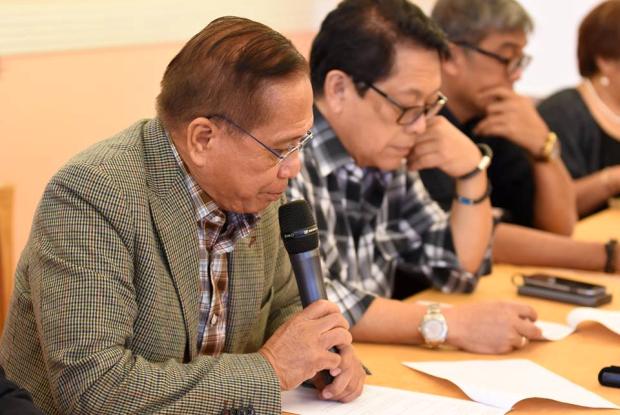
Secretary Jesus Dureza, presidential adviser on the peace process, announces the cancellation of the fifth round of talks with the NDFP on Saturday, May 27, 2017. Beside him is Labor Secretary Silvestre Bello III, chairman of the government negotiating panel. (Photo from the Facebook page of the Office of the Presidential Adviser on the Peace Process)
First published: 8:27 p.m., May 27, 2017
NOORDWIJK, The Netherlands — The peace talks between the government and communist insurgents could be the first major casualty of President Rodrigo Duterte’s declaration of martial law in Mindanao.
Government negotiators on Saturday withdrew from the latest round of talks with the National Democratic Front of the Philippines (NDFP) after communist rebels announced they would intensify operations against government forces in response to the martial law declaration.
Secretary Jesus Dureza, presidential adviser on the peace process, announced that with the “defiant, blatant and serious challenge” by the rebels despite the gains in the talks, the government panel decided “not to proceed to participate in the scheduled fifth round of peace negotiations until such time as there are clear indications that an enabling environment conducive to achieving just and sustainable peace” is attained.
The announcement was made at the beachside venue for the fifth round of talks in the Dutch city of Noordwijk where government and NDFP representatives had gathered to discuss the details of the Comprehensive Agreement on Socioeconomic Reforms, the Comprehensive Agreement on Political and Constitutional Reforms, and the proposed bilateral ceasefire agreement.
In Manila, presidential spokesperson Ernesto Abella also issued a statement saying the government “will not proceed” with the scheduled talks.
“We question the sincerity of the CPP/NPA/NDFP, if they truly are in pursuit of peaceful coexistence. The Duterte administration would rather pursue the path of genuine dialogue to build a nation worthy of its citizens,” he said.
NDFP senior adviser Luis Jalandoni informed reporters during a break in their preliminary meeting that the government panel sought the “cancellation” of the latest round.
Dureza explained that the order of the Communist Party of the Philippines (CPP) to its armed wing, the New People’s Army (NPA), to intensify attacks against government forces put the talks in “great jeopardy.”
The CPP issued the order after the President placed the entire Mindanao under martial law to deal with Islamic State-inspired terrorists belonging to the Abu Sayyaf and the Maute group that besieged Marawi City on Tuesday.
The CPP-NPA formed the main armed resistance to the martial law regime of the late dictator Ferdinand Marcos and expanded their forces during the dictatorship.
Jalandoni said the CPP directive to intensify attacks was not intended to undermine the negotiations but was a response to statements by Defense Secretary Delfin Lorenzana that the NPA would be a target of martial law.
Dureza said, however, that martial law was “principally directed at extremists and terrorists.”
The chief government negotiator, Labor Secretary Silvestre Bello III, said Lorenzana later clarified in a statement “that martial law is not intended for the NPA.”
On Friday, CPP founding chair Jose Maria Sison acknowledged the clarification and said the NDFP panel had recommended to the CPP to reconsider its order to the NPA.
“There is still hope that is why we are waiting for them. It is a reality that armed conflict exists that is precisely why we are talking,” Bello said.
NDFP chief negotiator Fidel Agcaoili also expressed optimism. He said the NDFP panel would formally respond to the government’s cancellation of the latest round of talks. /atm /PDI